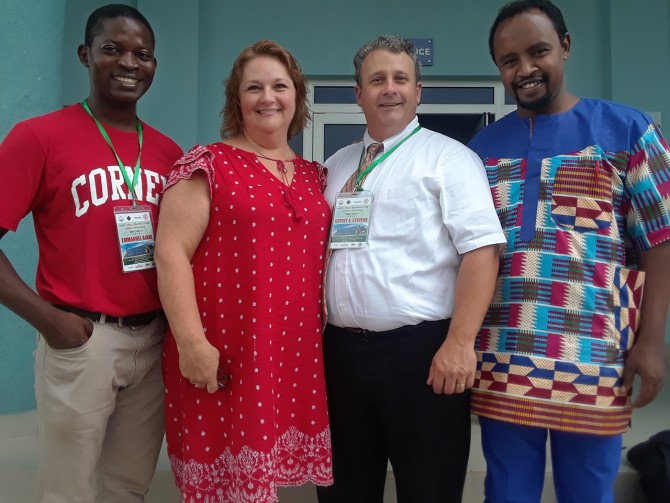Humphrey alums help Nigerians harness solar power
By Samantha Hautea
In 2014, a Center for Global Development report showed that 600 million Africans – approximately half the continent’s population – had no reliable access to electricity. Even urban areas with high electrical grid coverage may experience several hours of blackouts and power outages per day.
Solar energy has emerged as a popular alternative source of energy in Nigeria, but the supply of qualified solar installers has proven unable to meet the growing demand. To address this gap and deliver a solar installation training program, a team from Cornell has partnered with Alfred State College and the National Agency for Science and Engineering Infrastructure (NASENI) of Nigeria.
“Solar electricity is growing very fast, but the activities of fake solar installers in the past marred the integrity of solar energy systems,” said Emmanuel Adewale Ajani, chief engineer at NASENI and a 2017-18 Hubert H. Humphrey Fellowship alumnus from Cornell.
“There is need to build capacity in solar installation skills at a rate equal or greater than the demand,” Ajani said. “If this is not done, it will lead to poorly installed solar systems, which will discourage others from installing solar in the future.”
With Tarig Ahmed, a 2017-18 Cornell Humphrey alum from Sudan, and Joseph Abu, a 2019 M.P.A. candidate and member of the Cornell Institute for Public Affairs, Ajani applied for a student summer project grant issued by the Institute for African Development at the Mario Einaudi Center for International Studies at Cornell. The three have been awarded $10,000 to conduct a program to train and mentor potential solar energy systems installers in Nigeria and encourage them to become entrepreneurs and service providers.
Cornell is one of 13 universities that administer the Hubert H. Humphrey Fellowship, a Fulbright Exchange Activity that brings midcareer professionals from developing countries to the United States to enhance their leadership potential and managerial skills by interacting with their U.S. counterparts. Ajani credited the inspiration for the project to Alfred State College’s School of Applied Technology, where he had his professional affiliation (the Humphrey program’s equivalent of an internship), which gave him hands-on experience with solar installations.
“This project is an exciting example of the impact the Humphrey fellows can make. For almost 40 years, the Humphrey Program at Cornell has helped create partnerships between high-impact U.S. institutions such as Alfred State and foreign organizations dedicated to rapid technological development such as NASENI,” said Peter Gregory, director of the Humphrey Program, who co-advises the team with Francine Jasper, associate director of International Programs in the College of Agriculture and Life Sciences.
The initial proposal intended to cover training for 20 students, but Ajani and his team expanded the program to train 53 students from July 30 to Aug. 10, 2018.
The pilot site for the training’s practical activities was Toko Village, a rural community close to Abuja, Nigeria’s capital. Since 1938, Toko Village has existed without basic infrastructure such as electricity and potable drinking water. Training participants worked with community members to drill a fresh borehole and install a solar water pump to supply water to the community.
Monthly monitoring and evaluations indicate that the installation has made a positive impact on the community’s health and water consumption. Trainees from the program have gone on to mentor solar installers in other communities and start up their own solar installation businesses.
“Over the next three years, my hope is that through the solar installation training program, an increasing number of skilled technicians and engineers will be trained and mentored in the area of solar installation, business and services,” Ajani said. “With this type of training, I'm hoping to increase access of households to solar electricity. I am working with Tarig Ahmed to submit proposals for similar programs in Sudan and Liberia for 2019.”
Cornell, which has hosted the Humphrey Program since 1979, has just won the bid to continue hosting the program until 2024. The 40th anniversary of the Humphrey Program at Cornell will be celebrated during the 2019-20 academic year.
The program is sponsored by the U.S. Department of State Bureau of Educational and Cultural Affairs. It is administered nationally by the Institute of International Education in Washington, D.C.
Samantha Hautea is a communications specialist in International Programs in the College of Agriculture and Life Sciences.
Media Contact
Get Cornell news delivered right to your inbox.
Subscribe

